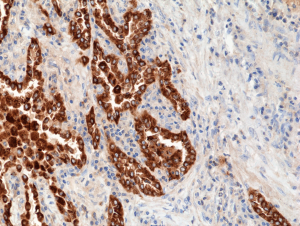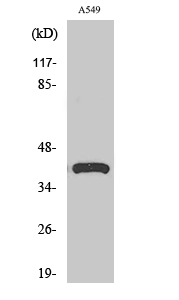
Immunohistochemical staining of formalin fixed and paraffin embedded human lung cancer tissue section using anti-SP-B rabbit monoclonal antibody (Clone RM370) at a 1:1000 dilution.
anti-Surfactant protein B (human), Rabbit Monoclonal (RM370)
REV-31-1256-00
ApplicationsWestern Blot, ImmunoHistoChemistry
Product group Antibodies
ReactivityHuman
TargetSFTPB
Overview
- SupplierRevMAb Biosciences
- Product Nameanti-Surfactant protein B (human), Rabbit Monoclonal (RM370)
- Delivery Days Customer2
- ApplicationsWestern Blot, ImmunoHistoChemistry
- CertificationResearch Use Only
- ClonalityMonoclonal
- Clone IDRM370
- Gene ID6439
- Target nameSFTPB
- Target descriptionsurfactant protein B
- Target synonymsPSP-B, SFTB3, SFTP3, SMDP1, SP-B, pulmonary surfactant-associated protein B, 18 kDa pulmonary-surfactant protein, 6 kDa protein, pulmonary surfactant-associated proteolipid SPL(Phe)
- HostRabbit
- IsotypeIgG
- Protein IDP07988
- Protein NamePulmonary surfactant-associated protein B
- Scientific DescriptionPulmonary surfactant is a complex mixture of phospholipids and proteins that is secreted from type II cells in alveoli and reduces the surface tension at the alveolar air-liquid interface, providing alveolar stability necessary for normal ventilation. Four distinct proteins isolated from pulmonary surfactant are termed surfactant proteins A, B, C, and D. SP-A (28-36kDa) and SP-D (43kDa) are collagenous carbohydrate-binding proteins, whereas SP-B (8-9kDa) and SP-C (4kDa) are non-collagenous hydrophobic proteins. SP-B is expressed in pulmonary adenocarcinomas with acinar, papillary, bronchioloalveolar, and solid growth patterns. Squamous cell and large cell carcinomas of the lung and nonpulmonary adenocarcinomas do not express SP-B. ProSP-B is glycosylated in the Golgi apparatus and undergoes carboxy- and amino-terminal proteolysis by a cathepsin D-like protease. - Recombinant Antibody. This antibody reacts to human SP-B (Surfactant protein B) and proSP-B. Applications: WB, IHC. Source: Rabbit. Liquid. 50% Glycerol/PBS with 1% BSA and 0.09% sodium azide. Pulmonary surfactant is a complex mixture of phospholipids and proteins that is secreted from type II cells in alveoli and reduces the surface tension at the alveolar air-liquid interface, providing alveolar stability necessary for normal ventilation. Four distinct proteins isolated from pulmonary surfactant are termed surfactant proteins A, B, C, and D. SP-A (28-36kDa) and SP-D (43kDa) are collagenous carbohydrate-binding proteins, whereas SP-B (8-9kDa) and SP-C (4kDa) are non-collagenous hydrophobic proteins. SP-B is expressed in pulmonary adenocarcinomas with acinar, papillary, bronchioloalveolar, and solid growth patterns. Squamous cell and large cell carcinomas of the lung and nonpulmonary adenocarcinomas do not express SP-B. ProSP-B is glycosylated in the Golgi apparatus and undergoes carboxy- and amino-terminal proteolysis by a cathepsin D-like protease.
- ReactivityHuman
- Storage Instruction-20°C,2°C to 8°C
- UNSPSC41116161






